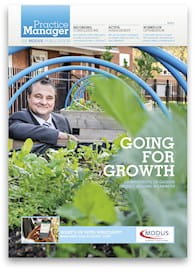THE widespread availability of smartphones with high-quality audio and video recording apps has led to an increasing number of patients asking to record their own consultations. Such devices are easily activated without a clinician realising. Even hand-held games consoles can record conversations. We are aware of a case where a GP discovered that a child had inadvertently managed to capture a consultation with his mother – on audio and video!
The headline message is: "patients don’t need consent to record their own consultation". Under UK data protection laws, the personal information contained in such a recording belongs to the patient and, providing no other patient is involved, they have the right to use that information as they choose.
This means that while the data is confidential to the patient, it is not to the clinician. There is no law against the patient doing with it as they please – including disclosing it to a third party or even posting it on the internet (except in extreme cases, such as where potentially obscene images may be included).
Clinicians do have privacy and data protection rights in relation to their own personal information. However, a consultation is focused on the patient’s medical care and does not require a clinician to disclose any of their own personal information. As such, there is no legal prohibition to a patient recording a consultation, even covertly, but more on that later.
This realisation can certainly be unsettling for some healthcare professionals, but it is important to avoid becoming overly defensive when dealing with such requests. The reality is that recording consultations is now a product of the digital age. Indeed, the GMC has stated that: "While the idea may be daunting at first recordings can be a great tool for doctors and patients looking to overcome barriers to communication and understanding".
There are a variety of reasons why patients might wish to record a consultation, and most of these are non-controversial and do not suggest an absence of trust or "ulterior motives". A patient might not fully understand what is being explained during a consultation, or may be unable to recall what was discussed. Recording a consultation can provide the means to process and reflect on often complex medical information.
The GMC encourages discussion with patients to fully understand the reasons behind such requests. A clinician who feels uncomfortable at the prospect of being recorded should be open and honest with the patient and explain why. Doing so may encourage understanding and possible compromise. For example, the patient might agree to an audio rather than video recording, or to avoid filming faces.
It is important to remember that any recording is likely to support and confirm the actions of a clinician and may be admissible in court, demonstrating professional practice (or the lack of) in any complaint or claim.
What about covert recording? MDDUS recently assisted a member following a consultation with a patient who had previously expressed dissatisfaction with various treatment options and had undertaken her own research on online chat groups. The GP discovered that she had covertly video recorded a consultation and posted it on her Facebook page. He felt that this had been a betrayal of their trust and therapeutic relationship.
What can a doctor do about this? The answer lies in considering the type of harm, if any, suffered. In this scenario, the patient had the right (under existing legislation) to post her personal medical information (i.e. the consultation) on social media, and it would be difficult to pursue any action for the manner in which she handled her information. The doctor could reasonably ask the patient to remove the recording but there is no legal obligation on her part to do so.
Had she added inappropriate comments or altered the recording to render it a misrepresentation of what transpired, then this could call into question the therapeutic relationship of trust
One way to avoid such situations arising is to focus on good communication. A patient who is engaged and reassured is probably less likely to feel the need to covertly record a consultation. It is also worth bearing in mind that if a doctor were to refuse a reasonable request to record a consultation, the patient may be more inclined to do so covertly in future.
MDDUS advises that any doctor concerned about allowing a patient to record should consider efforts taken to properly understand the request. Has the patient been offered alternatives, such as bringing a family member or carer along to the consultation? Could you provide a copy of the consultation notes or other written guidance to help the patient reflect on the issues discussed?
Allowing patients to record consultations could be viewed as an opportunity in a more transparent health service. In any event, it is not something that can be easily policed or prevented – even if a patient is confronted with their finger on the record button!
Alan Frame is a risk adviser at MDDUS
This page was correct at the time of publication. Any guidance is intended as general guidance for members only. If you are a member and need specific advice relating to your own circumstances, please contact one of our advisers.
Read more from this issue of Practice Manager

Save this article
Save this article to a list of favourite articles which members can access in their account.
Save to library